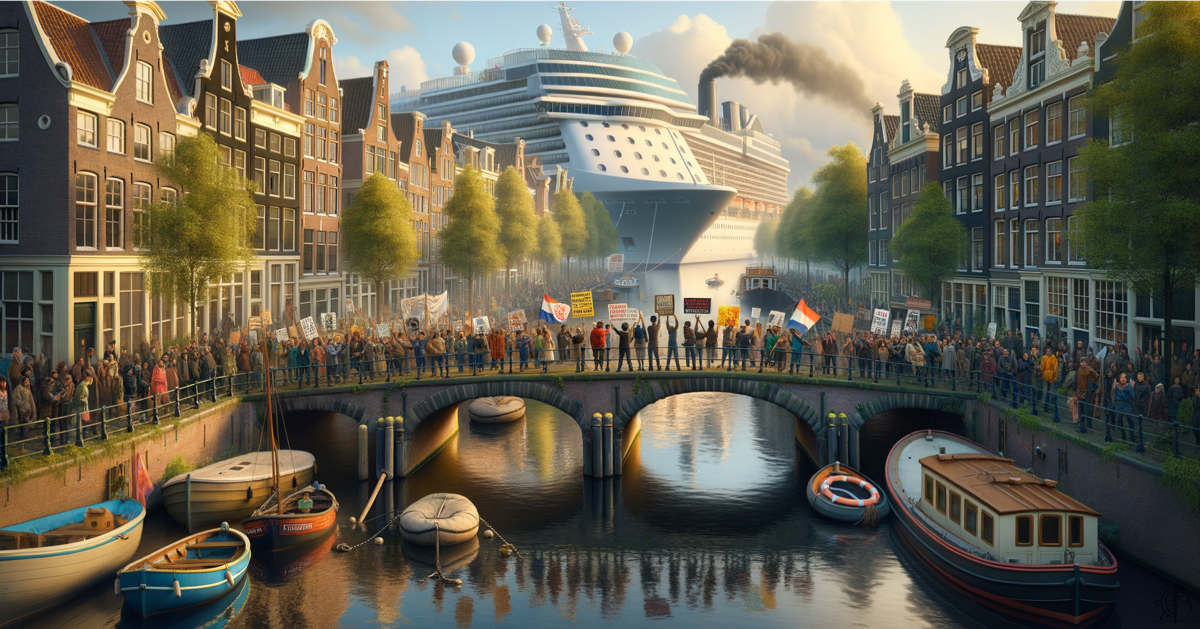Activists block cruise ships in Amsterdam protest

In a significant display of protest, Dutch environmental activists from the Extinction Rebellion group took to the waters of Amsterdam to block cruise ships from entering the city. This action involved chaining themselves to a bridge that is crucial for access to the city’s central locks, effectively halting the arrival of major cruise lines. This incident has highlighted the growing tension between environmental concerns and the cruise industry in recent years.
The activists targeted two cruise ships, Royal Caribbean’s Jewel of the Seas and the Regent Seven Seas Mariner. The blockage disrupted operations for these vessels over a two-day period, forcing the Jewel of the Seas to dock outside of Amsterdam at IJmuiden Lock. Passengers were then transported into the city by bus, illustrating the far-reaching impact of the protest on the cruise schedule.
On the second day of protests, when the Regent Seven Seas Mariner was scheduled to arrive, police intervened to remove the protesting activists. This action was prompted by a three-hour delay caused by the demonstrators, which frustrated not only the cruise line but also local authorities. Jeroen Verwoort, the Deputy Mayor of Velsen, acknowledged the right to protest but emphasized the importance of keeping shipping traffic flowing through the locks.
Extinction Rebellion's protest was part of a larger movement advocating for a cruise tax aimed at funding the development of cleaner marine fuels. While the activists have not disclosed whether they intend to continue blocking cruise ship visits in the future, their actions reflect a broader sentiment against the cruise industry’s environmental impact. This surge in anti-cruise sentiment is not limited to the Netherlands, as protests have spread throughout Europe, impacting numerous coastal communities.
The Environmental Impact of Cruise Ships
The increasing visibility of cruise ship operations has raised serious environmental concerns among various activists and local populations. The cruise industry, while big on tourism and economic gain, often faces criticism for its contributions to pollution and climate change related emissions. Some studies suggest that a single cruise ship can emit the same amount of sulfur dioxide as millions of cars, raising alarms about air quality and overall environmental health in port cities.
This latest protest by Extinction Rebellion is a response to those rising concerns, with activists advocating for sustainable practices within the maritime industry. Their calls for cleaner fuels illustrate a push for regulatory measures that can mitigate the environmental impact caused by large vessels, especially as global travel continues to expand.
Wider Implications of Cruise Protests
The ripple effects of protests against cruise lines are being felt beyond Amsterdam, as similar demonstrations have taken place across Europe. From Barcelona to Norway and Brittany, activists have organized events urging for more stringent regulations on cruise ship operations. These protests are often fueled by locals who feel overwhelmed by the influx of tourists and are increasingly vocal about the need for balance between tourism and quality of life.
A prominent instance of this growing movement occurred in Barcelona, where protests were organized against the perceived overtourism driven by the cruise industry. Local authorities and activism groups have expressed concerns about the strain that large amounts of tourists place on cities, prompting a discussion around limiting cruise ship access to protect the integrity of urban environments.
Responses from the Cruise Industry
The Cruise Lines International Association (CLIA), which represents major cruise lines, has responded to the rising tide of protests and public discontent. They have warned their members that changes may be necessary to avoid ports where sentiments against the industry are strong. This includes suggesting itinerary changes to accommodate local communities' concerns about the impact of mass tourism.
Marie Caroline Laurent, the director of CLIA Europe, noted that the phenomenon of "tourism-phobia" is becoming increasingly relevant not just in Spain, but throughout other Mediterranean nations. The perception of disruption caused by tourists is influencing both local policy and the strategies employed by cruise lines to maintain prosperous itineraries.
The Role of Local Governments and Policies
Local governments in popular tourist destinations are beginning to tackle the challenge of managing tourism sustainably. Regulations seeking to limit the number of large cruise ships docking in sensitive areas are gaining traction as civic engagement increases. This reflects a growing recognition that unchecked tourism can lead to long-term detrimental effects on communities and local ecosystems.
In the case of the protests in Amsterdam, local officials quickly moved to address the situation by allowing police to remove demonstrators. This action underscores the complexities faced by governments in finding the equilibrium between supporting local economies, and addressing environmental sustainability and the rights of citizens to voice their concerns.
What’s Next for Activists and the Cruise Industry?
Following the recent protests, Extinction Rebellion has left the door open regarding future actions against cruise lines. The group’s focus on environmental policies and their call for a cruise tax aimed at funding cleaner fuel options indicate that they intend to stay actively involved in the dialogue surrounding cruise industry regulations. Their determination to draw attention to the environmental consequences of cruising will likely lead to further demonstrations.
On the other hand, the cruise industry will need to adapt to the changing landscape of public sentiment regarding environmental responsibility. This adaptation may include investing in greener technologies and innovative solutions to reduce emissions, as well as strategic collaborations with local governments to promote sustainable tourism practices.
Conclusion
The recent protest by Extinction Rebellion in Amsterdam represents a crucial moment in the ongoing discourse between environmental advocates and the cruise industry. As the conversation about sustainable practices continues to evolve, it is evident that both sides will need to engage in meaningful discussions to reach collective solutions. The impact of such protests is likely to reshape the future of cruising in Europe and beyond.
FAQs
1. What specific actions did Extinction Rebellion take during the Amsterdam protest?
Activists from Extinction Rebellion chained themselves to a bridge to block two cruise ships from entering Amsterdam, affecting their docking schedules.
2. How did the protests impact cruise ship operations?
The Jewel of the Seas was forced to dock outside of Amsterdam, while the Regent Seven Seas Mariner faced delays of approximately three hours due to protest actions.
3. What is the main goal behind the protest against cruise lines?
The main goal is to push for a new cruise tax to fund the development of cleaner marine fuels, thereby reducing the environmental impact of cruise ships.
4. How are local governments responding to the rise of protests against cruises?
Local governments are beginning to implement regulations to limit cruise ship traffic in popular ports and are engaging in dialogues with activists to address community concerns.
5. Is the anti-cruise sentiment isolated to Amsterdam?
No, similar protests have erupted across numerous European countries, highlighting a broader movement against mass tourism associated with the cruise industry.




